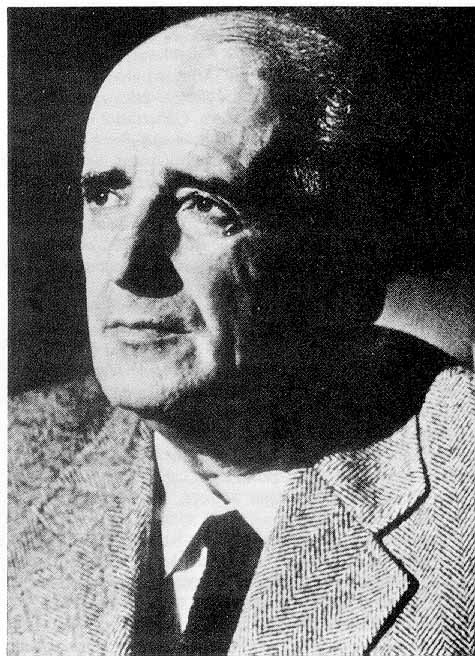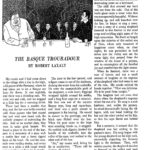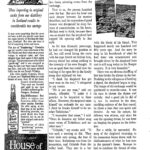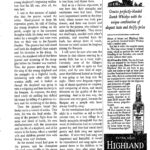Robert Laxalten 'The Basque troubadour'
Robert Laxalten ‘The Basque troubadour’ –
Testua: Antxoka Agirre
The Atlantic Monthly, 1963ko urria
Robert Laxalt (1923-2001) Kaliforniara emigraturiko euskal komunitatearen bigarren belaunaldiko kide izan zen. Ibilbide oparoko eta itzal handiko figura izan zen Laxalt: Nobelagile gisa oihartzun garrantzitsua lortu zuen AEBetan, hain zuzen ere bere euskal familiaren inguruko kontakizuna ardatz zuten lanekin (1957an argitaraturiko Sweet promised land, esaterako, best-sellerra izan zen) eta kazetari gisa Pullitzer sarietarako bi izendapen jaso zituen.

Testua argitaratu zuen The Atlantic Montly, berebat, kultur eta literatur aldizkari bat da, 1857an Bostonen sortua eta hamarkada askoan salmentetan nahiz oihartzunean New Yorker handiari Estatu Batuetan itzala egin izan dion bakarra.
The Basque troubadour honek bere lehengusuarekin Pirinioetan buelta bat eman ondoren herrixka bateko tabernan aterpea bilatzen duen narratzaile amerikarraren ahotsa eskaintzen digu. Bertan ikusitako bi bertsolariren arteko lehia kontatzen da, Oxaldek eta Etxahunek aspaldi batean izandako saioarekin loturak eginez, eta estetikoki western baten trazak hartzen dituen fikzioa osatuz: gauaren erdian guztien begiradapean sarrerako atea zeharkatzen duen lehen pertsonaia; arerioarekin begiradak gurutzatu eta bakoitza tabernaren punta banatan nola jartzen diren; begirada berri batekin desafioa nola onartzen duten…
“The door to the tavern opened and a figure came in out of the darkness, shaking the water form his umbrella. He wore the unmistakable garb of the shepherd, a wide beret, leggings wrapped tightly around his lower legs, and a long blue cape for a raincoat. His face was of the ancient Basque type, long and razor-lean, and there was a pride almost to arrogance in his bearing. He waved in answer to the greetings and his black eyes flicked over the bar
(…) When his gaze came to the huge paysan standing beside us, it stopped. He nodded with dignity, hooked the handle of his umbrella into the collar of his cape, and walked to the other end of the bar (…) I looked at the paysan standing next to us. He was hunched over the bar, but in an easy attitude of waiting. His eyes were crinkled in flesh, and there was a mischievous smile on his lips.
(…) The chill that coursed my back was not from the cold. Out of this burly giant came a tenor voice that was beautiful. Without looking up, an still hunched over the bar he began to sing a storu of a young shepherd fated to live forever in the cruel crags an swirling night mists of the high mountains (…) he coyld look down into the valley and see the warm light that peeped from the window of the house of a paysan, and contemplate all the familial joy and comfort that the light meant.”





